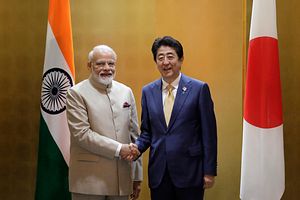The Dharma Guardian joint exercises between Japan and India are emblematic of the growing cooperation between the two in the defense realm. It also represents the coming of age of the blossoming cooperation between the Japan Ground Self-Defense Force (JGSDF) and their Indian counterparts, the Indian Army. These exercises cover “platoon level joint training on counter terrorism operations in jungle and urban scenario” and are being held between October 19 and November 2.
Anti-terror cooperation is a new area for both India and Japan — and important for both of them. While India has faced a litany of terror attacks in the past, Tokyo needs to be prepared for the upcoming Tokyo Olympics and for terrorist threats to Japanese citizens overseas. India has suffered from the onslaught of maritime terrorism too, as seen in the November 2008 Mumbai terror attacks. At the same time, Japanese citizens in the past have been caught up in terror-related incidents in the Middle East.
Japan’s defense cooperation with India has increased at all levels in recent years. The conduct of the Dharma Guardian exercises means that now all the three wings of the Japan Self Defense Forces (SDF)- the Japan Maritime Self-Defense Force (JMSDF), the Japan Air Self-Defense Force (JASDF) and the Japan Ground Self-Defense Force (JGSDF) are now holding joint exercises with their Indian counterparts. Apart from these bilateral exercises, the Indian Navy, the U.S. Navy and the JMSDF also take part in the trilateral Malabar naval exercises. In addition, JMSDF vessels have been making frequent port calls at Indian ports. It is worth mentioning here that Japan maintains a facility in Djibouti and the Indian Navy is one of the major actors in the Indian Ocean region. Besides, India’s Andaman and Nicobar islands lie astride key sea lanes of communication between energy-rich regions like the Middle East and energy importers like Japan.
India and Japan are also scheduled to have so-called 2+2 talks later this year between their foreign and defense ministers before the annual summit meeting of their two prime ministers. In the upcoming future, there are immense opportunities for cooperation between Japanese and Indian defense firms as the Abe government is keen to push defense exports, while New Delhi is looking at alternate sources of weapons imports in order to reduce its traditional reliance on Russia. On the other hand, Tokyo has been facing a very uncertain regional environment given the challenges on the North Korean front, fraught ties with South Korea, and the reluctance of the Trump Administration to censure Pyongyang over its recent short-range missile tests.
The location of the Dharma Guardian exercises – the famed-Counter Insurgency and Jungle Warfare School, Vairengte, in the border state of Mizoram in Northeast India is also significant given the fact that Northeast India has emerged as an important area of cooperation between Japan and India. Exercises like Dharma Guardian only go to show that in the upcoming future, cooperation between India and Japan in the realm of defense is set to receive a fillip, given their common interest in a free and open Indo-Pacific.
Dr. Rupakjyoti Borah is a Senior Research Fellow with the Japan Forum for Strategic Studies in Tokyo. The views expressed are personal.

































